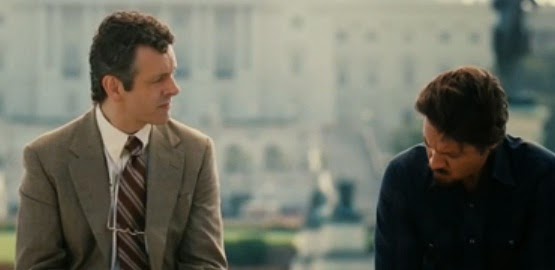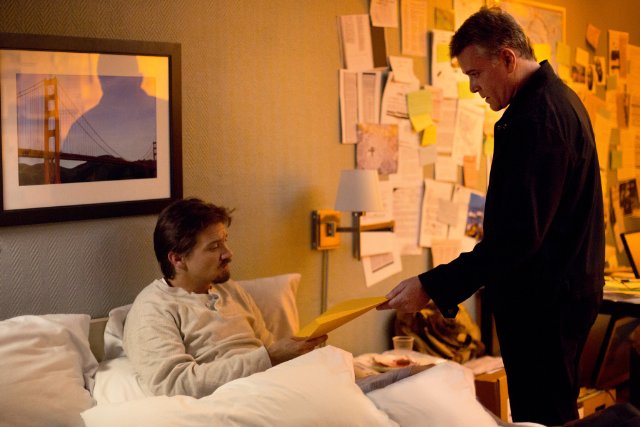Kill The Messenger Review
"What is Right and What is Easy"
A wise man once said, "Dark and difficult times lie ahead. Soon we must all make the choice between what is right and what is easy." Albus Dumbledore never lied. We often face such choices everyday. Consider young Malala Yousafazi who survived an assassination attempt by the Taliban two years ago because she did what she believed was right, knowing her life could be in danger. It would have been far easier for her to remain silent. Of course, there are others throughout history who could be placed in this discussion. Others who have had to suffer because they refused to back down, stay silent and turn a blind eye to the atrocities they observed in the world. Gary Webb is one such person to add to the pantheon of courageous individuals who chose to do what was right and screw 'easy'.
Kill the Messenger is the kind of movie that reminds us of the power of not just the written word, but the power of one's voice in general particularly as it pertains to the truth. We see many articles today on many subjects in fact; we are bombarded with them both online and in print. Written voices are nearly inescapable whether what those voices share is true or not. Every story matters to someone on some level as there is a demand it seems for say, stories about the personal lives of celebrities, or stories about cute and cuddly animals. However, what happens when a story is written about something that matters to many in a much bigger way than any trivial tale? Dark and difficult times indeed lie ahead for the writer who dares to shine a light in a dark and ugly corner.

Investigative reporter Gary Webb (Jeremy Renner) stumbles upon the story of his career, which suggests the American government, particularly the CIA, was involved in bringing drugs into the United States, while providing arms for the Contras. It is a story that singlehandedly takes a local newspaper out of the shadows of obscurity and puts it at the center of the national and international stage. Webb is initially hailed for his strong reporting and has even been selected for an award.
Convinced his discovery is only the beginning, and not content to rest on his laurels, he continues digging in an attempt to expose just how deep everything goes. Meanwhile, every other major newspaper is working tirelessly to discredit Webb's work and Webb as a man. Add to that the fact that Webb is also in the crosshairs of government officials and his marriage is in trouble, and we have a recipe for a story that is ripe with tension as we watch a man struggle against all odds to reveal the truth at great personal and professional cost.

Most of the time, if we are told that a film is based on true events, that's enough to put the audience in the frame of mind that what is being witnessed actually happened in some form or another. We know that some creative license is being taken somewhere, but we are still in the mindset that the major story beats happened.
Kill the Messenger is no exception, but its narrative choices make you take notice. It uses archival real footage from news outlets during the time in which Webb worked on his
Dark Alliance series, which not only add to the authenticity of what we see, but also puts what we are witnessing into a clear context. We see real footage from Presidents Nixon, Ford, Regan and Carter for instance, discussing their stance on drugs and the all-out offensive on drugs in America. All the real life footage interspersed in the film could have been heavy-handed, but it is done in such a way that we get just enough to tell us where we are in time while being asked to take the subject matter seriously.
Jeremy Renner also gives us cause to take this story seriously. He easily turns in a fine performance as the stubborn investigative reporter. Renner is the reason we care about the plight of Webb and what he is fighting for. He displays great range as a loving father and husband, but he does so also as a passionate intrepid reporter proving yet again that Renner is a force for certain. This role could very well yield him another Academy Award nomination.

The supporting cast is also quite compelling. Particularly Rosemarie DeWitt and Lucas Hedges who play Susan Webb and Ian Webb, respectively. The family scenes provide some of the films most beautiful and also poignant moments. Those moments also underscore the stakes for Webb as well as bring up the choice between family or the truth. We are asked what is more important: the families of this country who suffered and are still suffering as a direct result of the drugs brought into this country or the individual family of one charged to expose the government's dirty secrets.
The 1976 film
All the President's Men comes to mind and how
The Washington Post reporters Bob Woodward and Carl Bernstein were charged to investigate a seemingly unimportant story, which led to the discovery of a political scandal that went all the way to the presidency. Woodward and Bernstein's lives, like Gary Webb's, were also in danger at some point during the investigation of Watergate. However, there is no happy ending for Webb as there was for the reporters of Watergate. Ultimately, he decided that the truth was his responsibility to share. It was a responsibility bigger than him.
 Kill the Messenger
Kill the Messenger reminds us of the power we have, the dangers of speaking out against authority, and it inspires us to be bold in our questioning of the status quo, even if we are alone. If nothing else, it gets us to at least think about what it means to be brave enough when everything is on the line. Gary Webb paid a heavy price, but got the world to take notice of the wrongs he attempted to set right.
Pros
- Jeremy Renner's intense and passionate performance
- Rosemarie DeWitt's performance
- Andy Garcia's brief, but memorable appearance
- Strong use of actual archival news footage
- Unique shots where the subjects weren't centered or in focus added a sense of paranoia
 Investigative reporter Gary Webb (Jeremy Renner) stumbles upon the story of his career, which suggests the American government, particularly the CIA, was involved in bringing drugs into the United States, while providing arms for the Contras. It is a story that singlehandedly takes a local newspaper out of the shadows of obscurity and puts it at the center of the national and international stage. Webb is initially hailed for his strong reporting and has even been selected for an award.
Convinced his discovery is only the beginning, and not content to rest on his laurels, he continues digging in an attempt to expose just how deep everything goes. Meanwhile, every other major newspaper is working tirelessly to discredit Webb's work and Webb as a man. Add to that the fact that Webb is also in the crosshairs of government officials and his marriage is in trouble, and we have a recipe for a story that is ripe with tension as we watch a man struggle against all odds to reveal the truth at great personal and professional cost.
Investigative reporter Gary Webb (Jeremy Renner) stumbles upon the story of his career, which suggests the American government, particularly the CIA, was involved in bringing drugs into the United States, while providing arms for the Contras. It is a story that singlehandedly takes a local newspaper out of the shadows of obscurity and puts it at the center of the national and international stage. Webb is initially hailed for his strong reporting and has even been selected for an award.
Convinced his discovery is only the beginning, and not content to rest on his laurels, he continues digging in an attempt to expose just how deep everything goes. Meanwhile, every other major newspaper is working tirelessly to discredit Webb's work and Webb as a man. Add to that the fact that Webb is also in the crosshairs of government officials and his marriage is in trouble, and we have a recipe for a story that is ripe with tension as we watch a man struggle against all odds to reveal the truth at great personal and professional cost.
 Most of the time, if we are told that a film is based on true events, that's enough to put the audience in the frame of mind that what is being witnessed actually happened in some form or another. We know that some creative license is being taken somewhere, but we are still in the mindset that the major story beats happened. Kill the Messenger is no exception, but its narrative choices make you take notice. It uses archival real footage from news outlets during the time in which Webb worked on his Dark Alliance series, which not only add to the authenticity of what we see, but also puts what we are witnessing into a clear context. We see real footage from Presidents Nixon, Ford, Regan and Carter for instance, discussing their stance on drugs and the all-out offensive on drugs in America. All the real life footage interspersed in the film could have been heavy-handed, but it is done in such a way that we get just enough to tell us where we are in time while being asked to take the subject matter seriously.
Jeremy Renner also gives us cause to take this story seriously. He easily turns in a fine performance as the stubborn investigative reporter. Renner is the reason we care about the plight of Webb and what he is fighting for. He displays great range as a loving father and husband, but he does so also as a passionate intrepid reporter proving yet again that Renner is a force for certain. This role could very well yield him another Academy Award nomination.
Most of the time, if we are told that a film is based on true events, that's enough to put the audience in the frame of mind that what is being witnessed actually happened in some form or another. We know that some creative license is being taken somewhere, but we are still in the mindset that the major story beats happened. Kill the Messenger is no exception, but its narrative choices make you take notice. It uses archival real footage from news outlets during the time in which Webb worked on his Dark Alliance series, which not only add to the authenticity of what we see, but also puts what we are witnessing into a clear context. We see real footage from Presidents Nixon, Ford, Regan and Carter for instance, discussing their stance on drugs and the all-out offensive on drugs in America. All the real life footage interspersed in the film could have been heavy-handed, but it is done in such a way that we get just enough to tell us where we are in time while being asked to take the subject matter seriously.
Jeremy Renner also gives us cause to take this story seriously. He easily turns in a fine performance as the stubborn investigative reporter. Renner is the reason we care about the plight of Webb and what he is fighting for. He displays great range as a loving father and husband, but he does so also as a passionate intrepid reporter proving yet again that Renner is a force for certain. This role could very well yield him another Academy Award nomination.
 The supporting cast is also quite compelling. Particularly Rosemarie DeWitt and Lucas Hedges who play Susan Webb and Ian Webb, respectively. The family scenes provide some of the films most beautiful and also poignant moments. Those moments also underscore the stakes for Webb as well as bring up the choice between family or the truth. We are asked what is more important: the families of this country who suffered and are still suffering as a direct result of the drugs brought into this country or the individual family of one charged to expose the government's dirty secrets.
The 1976 film All the President's Men comes to mind and how The Washington Post reporters Bob Woodward and Carl Bernstein were charged to investigate a seemingly unimportant story, which led to the discovery of a political scandal that went all the way to the presidency. Woodward and Bernstein's lives, like Gary Webb's, were also in danger at some point during the investigation of Watergate. However, there is no happy ending for Webb as there was for the reporters of Watergate. Ultimately, he decided that the truth was his responsibility to share. It was a responsibility bigger than him.
The supporting cast is also quite compelling. Particularly Rosemarie DeWitt and Lucas Hedges who play Susan Webb and Ian Webb, respectively. The family scenes provide some of the films most beautiful and also poignant moments. Those moments also underscore the stakes for Webb as well as bring up the choice between family or the truth. We are asked what is more important: the families of this country who suffered and are still suffering as a direct result of the drugs brought into this country or the individual family of one charged to expose the government's dirty secrets.
The 1976 film All the President's Men comes to mind and how The Washington Post reporters Bob Woodward and Carl Bernstein were charged to investigate a seemingly unimportant story, which led to the discovery of a political scandal that went all the way to the presidency. Woodward and Bernstein's lives, like Gary Webb's, were also in danger at some point during the investigation of Watergate. However, there is no happy ending for Webb as there was for the reporters of Watergate. Ultimately, he decided that the truth was his responsibility to share. It was a responsibility bigger than him.
 Kill the Messenger reminds us of the power we have, the dangers of speaking out against authority, and it inspires us to be bold in our questioning of the status quo, even if we are alone. If nothing else, it gets us to at least think about what it means to be brave enough when everything is on the line. Gary Webb paid a heavy price, but got the world to take notice of the wrongs he attempted to set right.
Kill the Messenger reminds us of the power we have, the dangers of speaking out against authority, and it inspires us to be bold in our questioning of the status quo, even if we are alone. If nothing else, it gets us to at least think about what it means to be brave enough when everything is on the line. Gary Webb paid a heavy price, but got the world to take notice of the wrongs he attempted to set right.